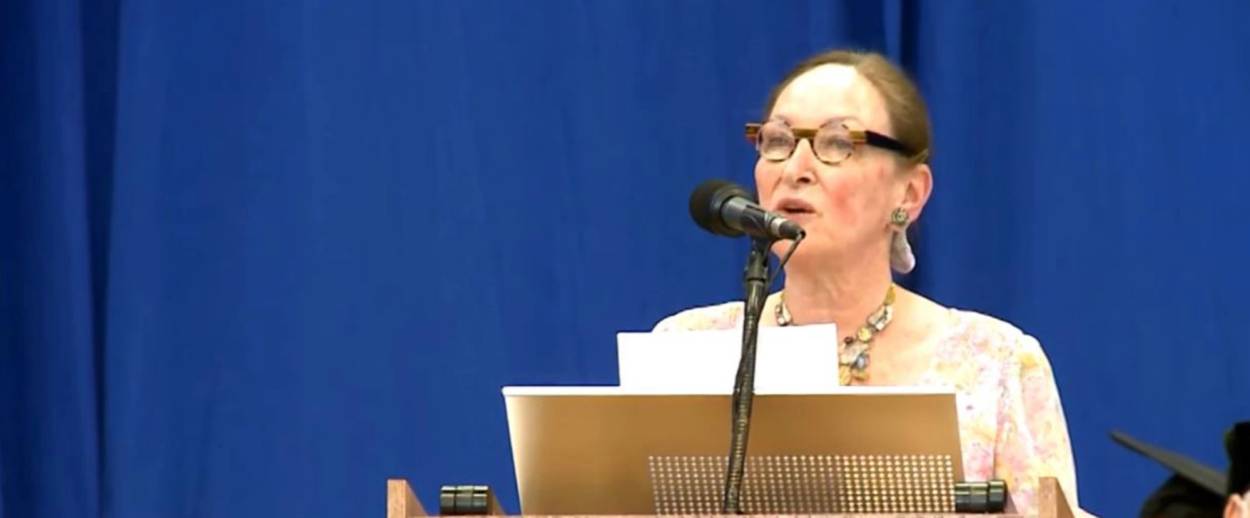Watch the Powerful Graduation Address of the First Jewish Woman to Serve on Canada’s Supreme Court
Justice Rosalie Abella offered a tearful account of how American ideals inspired her and her father, a Holocaust survivor and refugee




From the devastating terrorist attack on LGBT club-goers in Orlando, to Donald Trump’s xenophobic rhetoric against Muslims and Mexicans, traditional American notions of tolerance have taken quite a beating over the last few weeks. As the negative headlines dominate cable news and social media, it’s important to remember, then, that this is not close to the whole American story.
Yale Law School graduates received just such a reminder in a moving but little-noticed graduation address on May 23 from Canadian Supreme Court Justice Rosalie Abella, who was receiving an honorary degree. Abella, the first Jewish woman to serve on Canada’s high court, opened by acknowledging that she was speaking at a turbulent moment in American history:
In these frenetically fluid, intellectually sclerotic, economically narcissistic, ideologically polarized, and rhetorically tempestuous times, a world that too often feels like it’s spinning out of control, we need a legal profession that worries about what the world looks and feels like to those who are vulnerable.
Abella did not dwell on these darker currents, however. Instead, she related the remarkable story of how she came to be a lawyer. It began with her father, Jacob Silberman, whose own dreams of a legal career were thwarted first by Polish anti-Semitism and then by the Nazis. Having spent years preparing to be admitted to the Polish judiciary, he instead found himself in concentration camps following the outbreak of World War II. Silberman’s two-year-old son, his parents, and his brothers were all murdered in Treblinka, while he and his wife survived.
After the war, Silberman taught himself English and was hired by the Americans to provide legal services to displaced persons in southwest Germany. Abella herself was born in Stuttgart in 1946, and the family immigrated to Canada several years later. Her father’s legal training was not recognized there, however. As a result, he became an insurance agent–and his daughter became determined from a young age to become a lawyer.
He never got to see her succeed. “My father died a month before I graduated from law school,” Abella recounted, her voice halting with emotion. “He never saw me get called to the bar. He never met his two grandsons, both of whom became lawyers and are here today. And he never lived to see me revel in the life of the law. But I feel his spirit and his legacy all around me in this room.”
“A few years ago,” Abella continued, “my mother gave me some of his papers from Germany. In those papers, I found the answer to why he always spoke so respectfully and appreciatively of Americans. I saw letters from American lawyers, prosecutors, and judges he worked with in the U.S. zone in Stuttgart. They were warm, compassionate, and encouraging letters, either recommending, appointing or qualifying him for various roles in the court system the Americans had set up in Germany after the war. These Americans believed in him, and as a result, they not only restored him, they gave him back his belief that justice was possible.”
“One of the most powerful documents I found was written by my father when he was head of the displaced persons camp in Stuttgart where we lived,” said Abella. “It was his introduction to Eleanor Roosevelt when she came to visit our DP camp in 1948.” It read:
We welcome you, Mrs. Roosevelt, as the representative of a great nation, whose victorious army liberated the remnants of European Jewry from death, and so highly contributed to their moral and physical rehabilitation. We shall never forget that aid rendered by the American people. We are not in a position of showing you many assets. The best we are able to produce are these few children. They alone are our fortune and sole hope for the future.
“As one of those children,” Abella concluded, “I am here to tell you that the gift of American justice at its best is the gift that keeps right on giving. A gift that propelled me from the DP camp in Germany to becoming the first Jewish woman on the Supreme Court of Canada, and now to this stage. I stand proudly before you, fellow graduates, believing as did my father that democracies and their laws represent the best possibility of justice, and that lawyers are the people who have the duty to make that justice happen, the duty to do everything humanly possible to make the world safer for our children than it was for their grandparents, so that all children–regardless of race, religion, or gender–can wear their identities with pride, in dignity, and in peace.”
At a time when those very ideals–and the American commitment to help the helpless, the refugee, and the stranger–are being openly challenged, Abella’s address is well worth watching in full:
Yair Rosenberg is a senior writer at Tablet. Subscribe to his newsletter, listen to his music, and follow him on Twitter and Facebook.